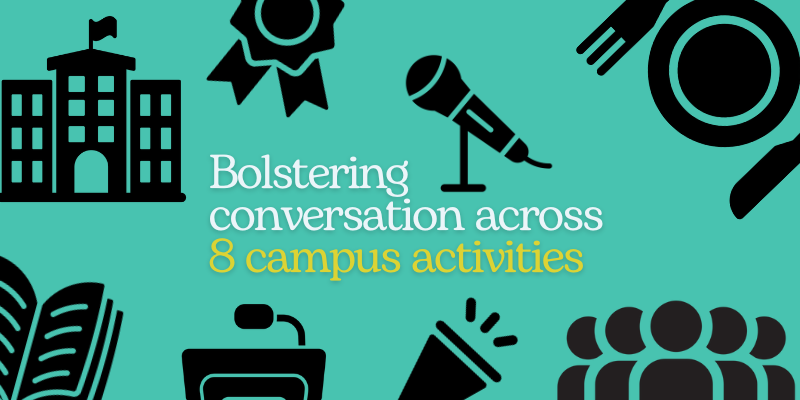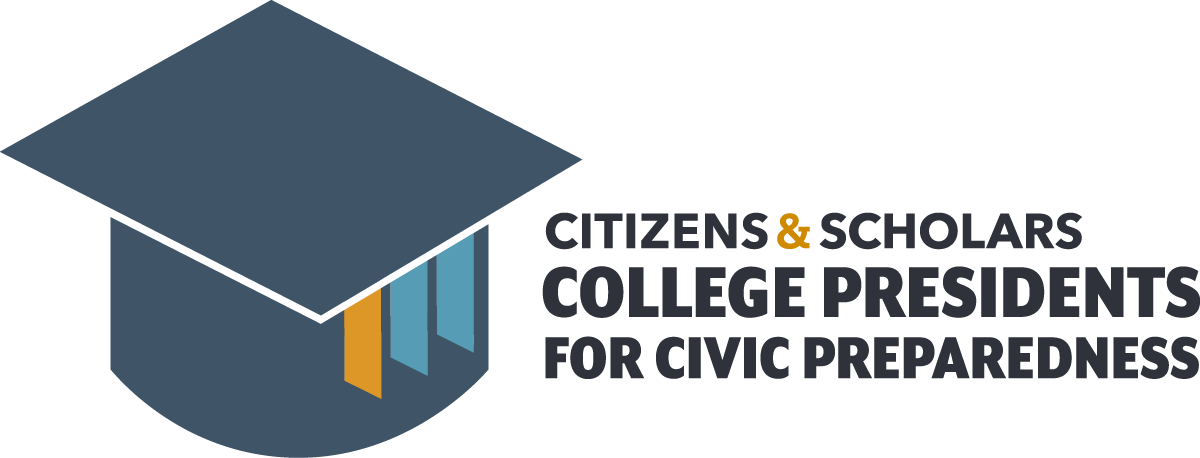Bolstering Conversations Across Eight Campus Activities

We launched Unscripted Campus Conversations to showcase the honest conversations happening on campuses across America to bridge divides in polarized times. Initiatives to strengthen productive dialogue are unfolding all over campus – from curriculum design to student-led groups to dialogue dinners and beyond. Campus-wide initiatives bolster skills in productive dialogue while increasing social permission and motivation to engage in difficult conversations. Below, we’ll highlight how productive conversations are happening across eight key areas:
Curriculum & Classroom
These initiatives emphasize skills for having productive conversations or engaging with perspectives different from one’s own in an academic setting. Faculty design curriculum to encourage debate, respectful dialogue, critical thinking, listening, and empathetic communication. Students learn to navigate difficult conversations in a structured classroom environment.
Dinner Series
Students, faculty, administration, and college presidents find common ground in an informal setting by gathering over a shared meal. Dinners often have a theme or shared prompts guided by facilitators to encourage empathetic listening and productive conversation. The informal, small-group setting builds connections in a relaxed, social setting.
Event
Campus-wide events—like panels, conferences, or debates—provide a forum for discussing pressing social issues. Carefully selected keynote speakers and panelists offer compelling insights and ideas. These events invite the broader community, opening a space for productive, respectful exchange of ideas and viewpoint diversity.
Faculty Professional Development
Institutions build capacity for productive dialogue across disciplines by sending faculty to institutes and workshops, including the College Presidents for Civic Preparedness Faculty Institute. The Faculty Institute is an 18-month virtual community of learning and purpose for junior and senior faculty. Faculty gain access to resources, support, and opportunities to hear and work with experts and faculty peers. They apply their learning to building models for civil discourse and collaborative problem-solving in the classroom.
Speeches & Talks
Inviting diverse speakers to campus, from scholars to activists to public figures, models viewpoint diversity. Subsequent Q&As give students and the public the opportunity to practice respectful communication, critical thinking, and access to ideas different from their own.
Student Programming
Campus centers and departments organize conferences and workshops focused on developing skills for productive conversations and addressing current challenges, including cyberbullying, dialogue across differences, and finding common ground. These programs complement academic learning, giving students the opportunity to practice discourse skills beyond the classroom.
Student-Led Organization
Student-led clubs or groups establish a space for peer learning and facilitation. These student organizations host events to promote viewpoint diversity, teach skills for having productive conversations like active listening, and empower students to lead culture change on campus.
Thematic Initiatives
Campus-wide efforts unite administration, faculty, leadership, and students around a central theme such as “discourse and dialogue” or “bridging divides.” These initiatives unify programming across curricula, campus events and shared campus goals. They embed the central theme into an institution’s strategic priorities.
These initiatives represent the campus-wide efforts to create an integrated model for establishing productive conversations across campus. In the classroom, in intimate settings like dinners or student-led groups, and in events or speaker’s series, college leaders prove that a strategic focus on dialogue fosters meaningful conversations across divides.
